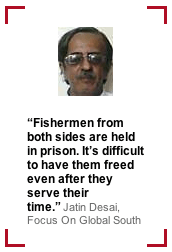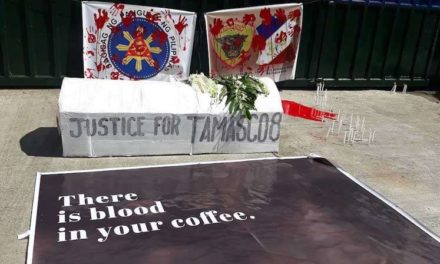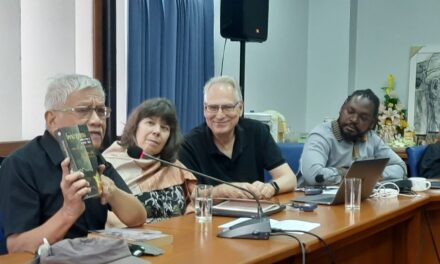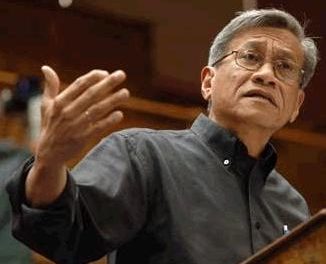from Outlook India. Twenty-seven years ago, Gopal Dass, a native of Punjab, strayed into Pakistan and has been there since, imprisoned under the Pakistan Official Secrets Act. Sentenced to life, Dass continues to languish, another name among the nameless who wander and get caught on either side of the border. These people are trapped in the bureaucratic apathy of the two nations who do little to free innocent citizens from the other side of the fence. Meanwhile their families, usually poor and illiterate, spend years knocking at several doors to free them. Save for individual efforts and organisations in both countries who have committed themselves to speaking up for them, help has taken a long time to reach the victims, at times too late.
Despite spending 27 years in jail in Pakistan for straying across the border, Gopal Dass is yet to be freed. The SC speaks out for him.
It is perhaps because of the inordinate delay in setting the men free that all eyes were on the Supreme Court of India. Dass’s relatives anticipated some directions when the petition seeking the immediate release and repatriation of Dass through diplomatic channels came up for hearing early this week. The petition could have been greeted with outright dismissal, for although it’s the highest court of the land, the Supreme Court’s jurisdiction is quite obviously confined to India. Striking a cautious note on March 14, however, the court spoke out, striving to stir the conscience of the two countries.
“We cannot give any directions to Pakistan authorities because we have no jurisdiction over them. However, that does not prevent us from making a request to the Pakistani authorities to consider the appeal of the petitioner (Gopal Dass) for releasing him on humanitarian grounds by remitting the remaining part of his sentence. We think it appropriate to make an appeal on humanitarian grounds to the Pakistan authorities to release the petitioner as he has served almost 27 years in jail,” the bench of Justice Markandey Katju and Justice Gyansudha Mishra observed. Referring to a civil society delegation from Pakistan that sought release of Pakistanis in Indian jails, the court said, “there is a humanitarian spirit on both sides, which we applaud”.
A final judgement is awaited, but in the interim, the observation made by the apex court has struck a chord with former judges in Pakistan, who have praised the order for striking the right emotive chord across the border.
“For the SC of India to make such an appeal is a positive step. And it’s heartwarming to hear it praise Pak activists.”Nasir Alam Zahid, Ex-Pak SC Judge
In fact, the tone of the present order had been set in a previous order of March 2010 when the Supreme Court ordered the release of 16 Pakistanis who had completed their sentence in India. “Under the Constitution, detention even for a second beyond the permitted period of sentence is illegal. Now you (the central government) are putting a condition that until they return a similar number of persons we cannot send them back. If Pakistan does not do something right, does that mean we should also follow them?”
The apex court’s order of 2010 said, “As regards the prisoners/foreigners who had been detained and who have completed their sentence and their nationality has been determined and has been accepted by the country of their origin, they shall be deported forthwith to their country. Regarding prisoners who have completed their sentence but whose nationality has not yet been determined, we direct the concerned ministry to determine their nationality as soon as possible so that appropriate orders can be passed.”
In the case of Dass, the matter is complicated in that, not only is there a confusion over the status of his sentence, that is, whether he has been set a prison term for life or for 25 years, the authority of the court does not extend to a foreign country. Hence the emotional appeal.
“The impediment is the bureaucratic rigmarole. I compliment the SC of India for trying to end such illegal detention.”Iqbal Haider, Ex-Pak Law Minister
It’s this humanistic tone of the order that sets it apart from other previous observations, feel Pakistan’s jurists. Iqbal Haider, former law minister of Pakistan, says, “The Indian Supreme Court order underscores the importance of the role of the judiciary in protecting the rights of the people in the two countries when all else fails. The bureaucratic rigmarole is the main impediment in seeking freedom of these people, which forces us to seek the indulgence of the court. I compliment the Supreme Court for this order, which is to be lauded for trying to end illegal detention of citizens.”
Haider has moved a similar petition seeking the release of Indian prisoners in Pakistan. “Close to 442 Indian prisoners were released under the order of the Pakistan Supreme Court and we are now struggling for the release of 128 more prisoners in the jails of Sindh. There is no reason to keep them after they have served their sentences,” says Haider. A delegation of civil society members from India is also visiting Pakistan to take up this issue.
Former Pakistan Supreme Court judge Nazir Aslam Zahid says this is the best order to have come out of the courts in a long time. “For the highest court of India to make a request to another country, even though its jurisdiction is limited, I think is a positive step. Also, it is heartwarming to hear the Supreme Court of India appreciating our efforts too. As this is an exceptional case, the order sets a good precedent. I will take it up with the government of Pakistan,” says Zahid.
“Fishermen from both sides are held in prison. It’s difficult to have them freed even after they serve their time.”Jatin Desai, Focus On Global South
As of January 2011, there are 460 pakistani civilian prisoners and 48 fishermen in Indian prisons. Most of them languish for want of legal aid. In fact, it was to address this anomaly that consular access was seen as a corrective. Provision of consular access, an outcome of the bilateral agreement between India and Pakistan, has often not been adhered to because of the fractious relationship between the two countries. Further, the India-Pakistan Judicial Committee on Prisoners, set up in 2006 and comprising four members each from India and Pakistan, had recommended that consular access should be provided immediately to such prisoners and all of them shall be provided legal aid at all stages of their cases. It has met three times so far.
Jatin Desai, a research associate at Focus on the Global South, says, “The committee should meet regularly. Among others, poor fishermen of India and Pakistan continue to be victims of the hostile bilateral political relationship. They stray unwittingly into each other’s territorial waters and are arrested and given jail terms. To get them out becomes a difficult task even though many complete their sentences.”
Everyone agrees that the order has a persuasive value. Setting Dass free will take time and may not happen soon, despite his 27 years in jail. But how far the recent order stirs the conscience of the two countries to act, specially in the context of several other illiterate prisoners who remain trapped in no man’s land, remains to be seen.






![[IN PHOTOS] In Defense of Human Rights and Dignity Movement (iDEFEND) Mobilization on the fourth State of the Nation Address (SONA) of Ferdinand Marcos, Jr.](https://focusweb.org/wp-content/uploads/2025/07/1-150x150.jpg)



